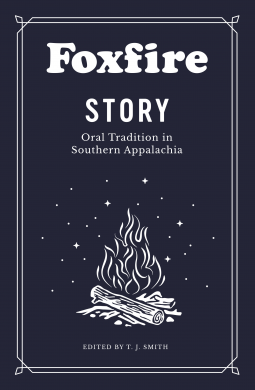Eerily prescient. [Foxfire Story edited by T.J. Smith]
Since 1972, the Foxfire books have preserved and celebrated the culture of Southern Appalachia for countless readers all around the world. In Foxfire Story, folklorist (and Foxfire director) T.J. Smith collects some of his favorite stories from the archives to illuminate the oral traditions that have been part of the culture of the mountains for centuries.
Here are instances of mountain speech, proverbs and sayings, legends, folktales, anecdotes, songs, and pranks and jests, along with ghost tales and accounts of folk belief, as well as stories from half a dozen of the region’s finest storytellers. Through these examples, Smith examines the role storytelling plays in the Southern Appalachian community, identifying the rich traditions that can be found in the region and exploring how they convey a sense of place—and of identity.
Folktales are important because they maintain cultures and their histories. They main traditions and strength generational bonds. I know loosely of the Appalachia and its history, but I feel better acquainted having read this book. A fresh acquaintance with another page of U.S. History. Foxfire Story: Oral Tradition in Southern Appalachia is a new publication from the Foxfire Fund, an organization with a 50 year plus legacy of preserving the oral histories and traditions of Southern Appalachia. I had my preconceptions of Appalachian culture going into my read, and they weren't necessarily challenged, but this was not meant to be a history text and I really came to appreciate the book for what is was, an ode to storytelling.
The point at which I came to fully appreciate the value of the text and the importance of the publication was during the relating of the personal histories in the context of the 1918 Pandemic. History repeats and that's why folk stories are particularly important, they can relay patterns and firsthand accounts. As the world moves through the COVID-19 pandemic, it was a wild time to have words and experiences in the past relating patterns we're seeing today in health responses, logistics, and impact disparities.
Another part I really enjoy were the supernatural tales. This publication is a genre-crossing anthology told in narrative form, through transcribed interviews. The reader is forewarned that some passages are best heard and when they are respectively available the reader is directed to where they might hear them. Still, reading along with my text-to-speech reader, the effect was similar to that, or at least better than reading alone. For its value as a book about storytelling, for all that I learned, and for the glimpse into Southern Appalachia and its history that it afforded me, Foxfire Story gets 5 stars from me.
Here are instances of mountain speech, proverbs and sayings, legends, folktales, anecdotes, songs, and pranks and jests, along with ghost tales and accounts of folk belief, as well as stories from half a dozen of the region’s finest storytellers. Through these examples, Smith examines the role storytelling plays in the Southern Appalachian community, identifying the rich traditions that can be found in the region and exploring how they convey a sense of place—and of identity.
Folktales are important because they maintain cultures and their histories. They main traditions and strength generational bonds. I know loosely of the Appalachia and its history, but I feel better acquainted having read this book. A fresh acquaintance with another page of U.S. History. Foxfire Story: Oral Tradition in Southern Appalachia is a new publication from the Foxfire Fund, an organization with a 50 year plus legacy of preserving the oral histories and traditions of Southern Appalachia. I had my preconceptions of Appalachian culture going into my read, and they weren't necessarily challenged, but this was not meant to be a history text and I really came to appreciate the book for what is was, an ode to storytelling.
The point at which I came to fully appreciate the value of the text and the importance of the publication was during the relating of the personal histories in the context of the 1918 Pandemic. History repeats and that's why folk stories are particularly important, they can relay patterns and firsthand accounts. As the world moves through the COVID-19 pandemic, it was a wild time to have words and experiences in the past relating patterns we're seeing today in health responses, logistics, and impact disparities.
Another part I really enjoy were the supernatural tales. This publication is a genre-crossing anthology told in narrative form, through transcribed interviews. The reader is forewarned that some passages are best heard and when they are respectively available the reader is directed to where they might hear them. Still, reading along with my text-to-speech reader, the effect was similar to that, or at least better than reading alone. For its value as a book about storytelling, for all that I learned, and for the glimpse into Southern Appalachia and its history that it afforded me, Foxfire Story gets 5 stars from me.
Foxfire Story was set to be published April 28, 2020.

Comments
Post a Comment